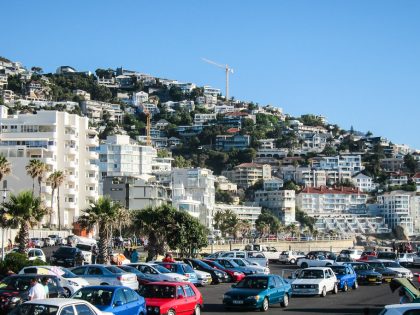Everything the government does
On the South African Department of Tourism's pending sponsorship deal with Premier League football club, Tottenham Hotspur.

Image credit Brad Tutterow via Flickr CC BY 2.0.
This week, reporting emerged that the South African Department of Tourism was preparing to conclude a R1 billion ($60 million USD), 3-year sponsorship deal with the English football club, Tottenham Hotspur.
Full disclosure: I am a beating heart fan of the Lily Whites.
It was embarrassing to see the deal clouded under so many suspicious details, including that the interim CFO of SA Tourism has links to an agency that could stand to benefit from the deal’s conclusion. It also does not help that the value of the deal is significantly more expensive compared to similar ones. Notably, Tottenham’s North London rivals, Arsenal, have a partnership with the Rwandan tourism board that is worth $36 million over four years. (And Arsenal has a more difficult job: It has to sportswash Rwanda’ autocratic regime.)
News of the prospective deal—which has received conditional approval—has drawn nothing but scorn and derision from the South African public. Notwithstanding concerns about its propriety, the tenor of most rebuke has focused on its timing; coming when the country is suffering through its worst spell of power cuts (emblematic of a collapsing, incapable state), and that it is a classic white elephant project, evident in the government picking a loser (Tottenham Hotspur).
None of these critiques engage the soundness of the initiative on its own terms, however. The criticisms are framed in the language of opportunity cost—the money could be better spent elsewhere. Although, as the reputed South African financial commentator Bruce Whitfield argues, R1 billion doesn’t travel far. In any case, this is R1 billion already earmarked for the department’s tourism budget, it is not as if it was ever going to go into building schools or hospitals. Even though the potential returns exposure could generate are hard to quantify, South Africans are drastically underestimating what repeated exposure could do to boost tourism in the country. Whitfield cites the return for Rwanda: “Visit Rwanda statistics showed that at the end of the first year of its sponsorship of Arsenal, 71% of fans would consider a holiday in the country from a negligible number the year before.”
South Africans are, in a classic show of exceptionalism, insisting that our country is already a widely-known tourist hot spot (by South Africa, what is usually meant is Cape Town, which in the minds of most foreign tourists, and some of the locals, has an identity outside of the country). All this is to ignore the wide appeal of a club like Tottenham, who, thanks to the stardom of South Korean Son Heung-Min, is building a rapidly growing Asian fan base. Spoilt for choice, Asian tourists historically aren’t prone to venturing far beyond the continent and its surrounds for their vacations. I’m making my own assumptions here, but consider what a ritual exhortation to “Visit South Africa” could do to unlock that market. The football clubs know this already. Increasingly preseason tours to the US have been ditched for Asia, especially China, South Korea and Japan. Then, add the Middle Eastern market, currently the fastest growing segments for the television audience of the Premier League.
Granted, and as everyone acknowledges, tourism in South Africa already suffers, because the country people would be visiting sucks in many ways. But this is rooted in a bizarre premise, namely, that it is not worth trying to attract tourists until our house is in order. The natural conclusion to this, is that a Department of Tourism is altogether futile, that South Africa does not deserve tourism in the first instance. Everything must be suspended until we “fix” the government. What is happening is the normalization of bare life—of the idea of society stripped of all functioning except social reproduction. For Aristotle, this is a realm outside of politics—politics is the pursuit of the good life, for some kind of collective ends.
For example, we all tend to support state investment in tourism because we believe it has a deeper purpose than the commercial payoff, that it advances national goals of identity formation and cultural exchange. The now-universal experience of load shedding has done more to foster a shared South African identity than most nation-building initiatives have—and even tourists can see and appreciate this. And we South Africans are being dishonest if we do not admit the perverse delight we derive from complaining to outsiders and extracting their pity. As Sisonke Msimang once put it, we have made a nation of our suffering.
Ultimately, what the backlash is primarily expressive of, is a hardening anti-state posture in middle-class sentiment. The government simply cannot do anything right, cannot try anything. It must simply “wither away.” This is an outlook as sterile as it is unproductive. Sooner rather than later, South Africans must accept that confronting our time’s biggest challenges—energy security and climate change especially—requires a bigger, not smaller government. This is a pill even the flag-bearers of capitalism are accepting. Just read the Financial Times or Wall Street Journal. What we need to fight for, is the democratization of the South African state, not its rollback.
The tendency to reflexively dismiss everything the government does—which, to be sure, is borne from a justifiable mistrust—could have the unintended consequence of discrediting the idea of government altogether. At bottom, that is a nihilistic outlook, one that can only reap further political and social dysfunction. If we don’t believe in the possibility of a shared life mediated through the state and other institutions, and only come to see it as a barrier to the pursuit of our own, individual ends (and if this is all we are concerned with), then we don’t believe in society at all.



